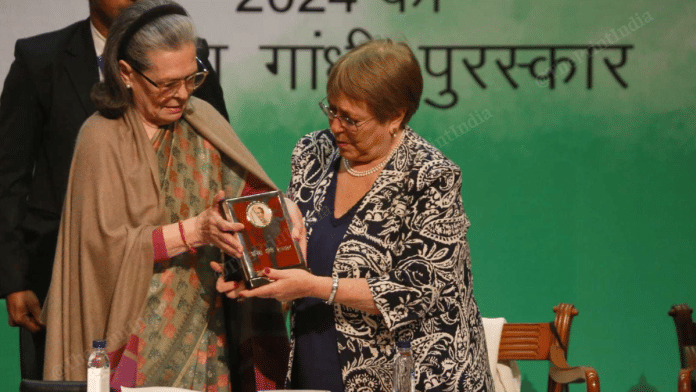New Delhi: The Bharatiya Janata Party (BJP) has criticised the Congress after Sonia Gandhi awarded the Indira Gandhi Prize for Peace, Disarmament and Development to former Chilean President Michelle Bachelet, invoking her past criticisms of the Citizenship Amendment Act (CAA) and the Jammu and Kashmir issue.
In 2019, commenting on the restrictions in Jammu and Kashmir in the aftermath of the abrogation of Article 370, Bachelet, then serving as the head of the UN Human Rights Council, had expressed deep concern about the “impact of recent actions by the Government of India on the human rights of Kashmiris”.
Bachelet had filed an application the next year, seeking to intervene as an amicus curiae in a litigation, then pending in the Supreme Court, against the CAA. The Centre had hit back, saying “no foreign party has any locus standi on issues pertaining to India’s sovereignty”.
BJP leader Amit Malviya posted on ‘X’ Thursday that “Congress’s decision to award the Indira Gandhi Peace Prize to Michelle Bachelet is as revealing as it is predictable”, alleging that she built her tenure on a “distinctly anti-India, pro-Islamist narrative that aligned perfectly with the global Left-Liberal ecosystem. Naturally, Congress rushed to celebrate her.”
The award, instituted in 1986, is administered by the Indira Gandhi Memorial Trust, chaired by Sonia Gandhi. Other members of the Gandhi family including Rahul Gandhi and Priyanka Gandhi Vadra are also members of the trust.
Today, I feel privileged to be able to say a few words on the life of another extraordinary, inspiring leader whom we are honouring. Former President of Chile, Michelle Bachelet, has seen, at first hand, loss, oppression, torture, and exile in her early years. It is a remarkable… pic.twitter.com/ZI8iRaR8kW
— Congress (@INCIndia) November 19, 2025
Bachelet is the 37th recipient of the award. The citation of the award to Bachelet, a member of the Socialist Party of Chile, lauded her for steadfastly striving for peace, gender equality, human rights, democracy and development in difficult circumstances and her contributions to India’s relations with Chile.
The first recipient of the award, in 1986, was Parliamentarians for Global Action, an international collective of legislators from various countries, in recognition of its “tenacious espousal of nuclear disarmament”. In 1986, it went to Mikhail Gorbachev, the then general secretary of the Communist Party of Soviet Union, for his “vision of a non-violent world free of nuclear weapons”.
Over the years, many recipients have been leaders who can be placed in the Centre-Left category, but not all. For instance, in 1997, it went to former US President Jimmy Carter for his work in the area of disarmament and peace, while in 2013, former German Chancellor Angela Merkel received it for her “exemplary leadership in Europe and the world during the financial crises, her stewardship of German economic growth and the promotion of global economic stability”.
In 2007, the Bill and Melinda Gates Foundation was awarded for its “pioneering and exemplary philanthropic work around the world and in India”.
In a twist of irony, both Muhammad Yunus, the current chief advisor of Bangladesh, and Sheikh Hasina, who was deposed as prime minister last year which led to Yunus’s rise, are also among the past recipients of the award. Yunus received it in 1998 for his contribution as the chairman of the Grameen Bank in the fight against poverty.
Eleven years later, in 2009, Hasina was the awardee for her contributions to the “promotion of democracy and pluralism and her determined drive to alleviate poverty”.
Centre-left leaders to have received it include Gro Harlem Brundtland, a member of Norway’s Labour Party who served three terms as the country’s prime minister, former President of Namibia and anti-apartheid activist Sam Nujoma, and President of Brazil Lula da Silva in 2010.
On the other hand, former President of the Czech Republic Vaclav Havel, who played a key role in toppling the Communist system in erstwhile Czechoslovakia, was awarded the prize in 1993.
Former Director General of the International Atomic Energy Agency (IAEA) Mohamed El Baradei, a Nobel Peace laureate, was the recipient of the prize in 2008.
Apart from individuals, institutions that received the award include Doctors Without Borders in 1996, ISRO in 2014, the Office of the UN High Commissioner for Refugees, the Centre for Science and Environment, and Pratham.
Former National Security Adviser Shivshankar Menon, former RBI governor Raghuram Rajan, former Planning Commission member Syeda Hameed, former Chief Information Commissioner Wajahat Habibullah, former journalist Suman Dubey, social activist Aruna Roy and former Chief Economic Advisor Kaushik Basu are the jury members of the award.
The code of procedure that guides the jury states that the award, which carries a cash purse of Rs 10 million along with a trophy made of Haematite Jasper, the same stone used in constructing the memorial of Indira Gandhi, is given for promotion of global peace, disarmament, racial equality and economic cooperation among others.
(Edited by Tony Rai)
Also Read: The voices of caution Rahul Gandhi ignored? Inside Congress’s Bihar freefall’






